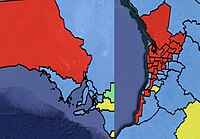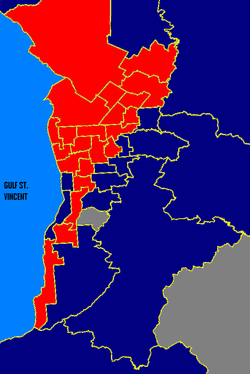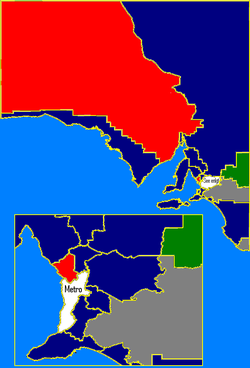| |||||||||||||||||||||||||||||||||||||||||||||||||||||||||
All 47 seats in the South Australian House of Assembly 24 seats were needed for a majority 11 (of the 22) seats in the South Australian Legislative Council | |||||||||||||||||||||||||||||||||||||||||||||||||||||||||
|---|---|---|---|---|---|---|---|---|---|---|---|---|---|---|---|---|---|---|---|---|---|---|---|---|---|---|---|---|---|---|---|---|---|---|---|---|---|---|---|---|---|---|---|---|---|---|---|---|---|---|---|---|---|---|---|---|---|
| |||||||||||||||||||||||||||||||||||||||||||||||||||||||||
 Results by electorate Results by electorate | |||||||||||||||||||||||||||||||||||||||||||||||||||||||||
| |||||||||||||||||||||||||||||||||||||||||||||||||||||||||
State elections were held in South Australia on 9 February 2002. All 47 seats in the South Australian House of Assembly were up for election, along with half of the 22 seats in the South Australian Legislative Council. The incumbent Liberal Party of Australia led by Premier of South Australia Rob Kerin was defeated by the Australian Labor Party led by Leader of the Opposition Mike Rann. The Labor Party won 23 out of 47 seats, and then secured the one more seat it needed for a majority by gaining the support of independent Peter Lewis.
Background
This was the first election since Labor narrowly lost as opposition in the 1997 election, doing much better than most analysts predicted, forcing the Liberals to minority government after their comprehensive loss in the 1993 election where Labor were reduced to just ten seats. Coming into the 2002 election, the Liberal Government had faced a number of scandals including the Motorola affair, over which Premier John Olsen was forced to resign in October 2001. He was succeeded by Rob Kerin, who had less than three months to govern before the election was called.
Key dates
- Issue of writ: 15 January 2002
- Close of electoral rolls: 22 January 2002
- Close of nominations: Friday 25 January 2002, at noon
- Polling day: 9 February 2002
- Return of writ: On or before 15 March 2002 (actually returned 26 February)
Results
House of Assembly
See also: Results of the South Australian state election, 2002 (House of Assembly); Members of the South Australian House of Assembly, 2002-2006; and Candidates of the South Australian state election, 2002|
South Australian state election, 9 February 2002 | ||||||
|---|---|---|---|---|---|---|
| Enrolled voters | 1,045,563 | |||||
| Votes cast | 978,569 | Turnout | 93.59 | +1.84 | ||
| Informal votes | 30,537 | Informal | 3.12 | -0.92 | ||
| Summary of votes by party | ||||||
| Party | Primary votes | % | Swing | Seats | Change | |
| Liberal | 378,929 | 39.97 | -0.43 | 20 | - 2 | |
| Labor | 344,559 | 36.34 | +1.18 | 23 | + 2 | |
| Democrats | 71,026 | 7.49 | -8.95 | 0 | 0 | |
| Family First | 25,025 | 2.64 | +2.64 | 0 | 0 | |
| One Nation | 22,833 | 2.41 | +2.41 | 0 | 0 | |
| Greens | 22,332 | 2.36 | +2.21 | 0 | 0 | |
| SA First | 16,902 | 1.78 | +1.78 | 0 | 0 | |
| National | 13,748 | 1.45 | -0.29 | 1 | 0 | |
| Independent | 40,288 | 4.25 | +1.12 | 3 | 0 | |
| Other | 12,390 | 1.31 | * | 0 | 0 | |
| Total | 948,032 | 47 | ||||
| Two-party-preferred | ||||||
| Labor | 465,227 | 49.07 | +0.58 | |||
| Liberal | 482,805 | 50.93 | –0.58 | |||
| ||||||||||||||||||||||||||||||||||||||||||||||||||||||||||||
| ||||||||||||||||||||
| ||||||||||||||||||||||||||||||
Independents: Rory McEwen, Bob Such, Peter Lewis
Seats changing hands
| Seat | Pre-2002 | Swing | Post-2002 | ||||||
|---|---|---|---|---|---|---|---|---|---|
| Party | Member | Margin | Margin | Member | Party | ||||
| Adelaide | Liberal | Michael Harbison | 2.2 | 3.2 | 1.0 | Jane Lomax-Smith | Labor | ||
| Colton | Liberal | Steve Condous | 1.0 | 5.6 | 4.6 | Paul Caica | Labor | ||
| Fisher | Liberal | Bob Such | 9.2 | N/A | 12.1 | Bob Such | Independent | ||
| Hammond | Liberal | Peter Lewis | 14.6 | N/A | 2.1 | Peter Lewis | Independent | ||
| MacKillop | Independent | Mitch Williams | N/A | N/A | 11.4 | Mitch Williams | Liberal | ||
- Members in italics did not recontest their seats.
- Bob Such and Peter Lewis were elected at the 1997 election as Liberals, but quit the party and recontested their seats as Independents and won. Pre-election margins are vs Labor, After margins are against Liberal.
- Mitch Williams was elected at the 1997 election as an Independent, but joined the Liberal party and recontested his seat as a Liberal. Margin is against Independent candidate Bill Hender.
Formation of Government
Labor won two seats from the Liberals, the districts of Adelaide (Jane Lomax-Smith) and Colton (Paul Caica). This gave Labor 23 seats, Liberals 20 seats, SA Nationals one seat, and three seats to independents. To form majority government, a party needed 24 seats out of 47. Most analysts expected Kerin to form a minority government with the support of Nationals MP Karlene Maywald, and the three independents, who were all former Liberal party members.
On 13 February, one of those crossbenchers, former Liberal Peter Lewis, announced that he had signed an agreement with Labor leader Mike Rann to support a Labor Government in exchange for holding a constitutional convention, making him speaker of the House of Assembly, and concessions for his electorate including the phasing out of commercial fishing in the River Murray, prioritising the eradication of the branched broomrape weed, changing water rates for irrigation, fast-tracking a feasibility study for a weir and lock at Wellington, and improving rural roads. This agreement effectively made Rann premier-elect by one seat.
However, following parliamentary precedent established by Don Dunstan following the 1968 election, Kerin refused to resign until Rann and Labor demonstrated that they had majority support on the floor of the House of Assembly. Kerin claimed to be within this rights to take this course, as longstanding precedent in the Westminster system holds that the incumbent premier should have the first opportunity to form a government if no party has a majority.
After three weeks of stalemate, the House of Assembly was called into session several weeks earlier than usual. With Lewis in the speaker's chair, the Kerin Government was defeated on the floor of the House of Assembly on 5 March 2002, after Kerin moved a confidence motion in his own government and lost. Rann then advised Governor Marjorie Jackson-Nelson that he could form a government, which was duly sworn in the following day.
Rann later shored up his government's majority by reaching agreements with crossbenchers Maywald and McEwen, giving them cabinet posts in exchange for their support of the government.
Legislative Council
See also: Results of the 2002 South Australian state election (Legislative Council); Members of the South Australian Legislative Council, 2002-2006; and Candidates of the South Australian state election, 2002|
South Australian state election, 9 February 2002 | ||||||
|---|---|---|---|---|---|---|
| Enrolled voters | 1,045,563 | |||||
| Votes cast | 983,567 | Turnout | 94.1 | +1.4 | ||
| Informal votes | 53,105 | Informal | 5.4 | +1.1 | ||
| Summary of votes by party | ||||||
| Party | Primary votes | % | Swing | Seats won |
Seats held | |
| Liberal | 373,102 | 40.1 | +2.3 | 5 | 9 | |
| Labor | 305,595 | 32.9 | +2.3 | 4 | 7 | |
| Democrats | 68,317 | 7.3 | –9.4 | 1 | 3 | |
| Family First | 47,443 | 4.0 | +4.0 | 1 | 1 | |
| Greens | 25,725 | 2.8 | +1.1 | 0 | 0 | |
| One Nation | 16,829 | 1.8 | +1.8 | 0 | 0 | |
| No Pokies | 11,984 | 1.3 | –1.5 | 0 | 1 | |
| Voluntary Euthanasia | 10,973 | 1.2 | +0.7 | 0 | 0 | |
| SA First | 9,567 | 1.0 | +1.0 | 0 | 1 | |
| HEMP | 8,241 | 0.9 | –0.8 | 0 | 0 | |
| Grey Power | 7,918 | 0.9 | –0.7 | 0 | 0 | |
| National | 4,412 | 0.5 | –0.5 | 0 | 0 | |
| Other | 40,356 | 4.3 | * | 0 | 0 | |
| Total | 930,462 | 11 | 22 | |||
In the Legislative Council, Liberal won 5 seats (Robert Lawson, Caroline Schaefer, Angus Redford, David Ridgway, Terry Stephens), Labor won 4 seats (Gail Gago, Paul Holloway, Terry Roberts, John Gazzola), Australian Democrats won 1 seat (Sandra Kanck), and the recently formed Family First party won their first ever seat in an Australian parliament (Andrew Evans).
This left the overall numbers in the Legislative Council at: Liberal 9, Labor 7, Democrats 3, Family First 1, No Pokies 1, and 1 independent (Terry Cameron).
Post-election pendulum
For previous pendulums and maps, see List of elections in South Australia.| Labor seats (24) | |||
| Marginal | |||
| Norwood | Vini Ciccarello | ALP | 0.5% |
| Adelaide | Jane Lomax-Smith | ALP | 1.0% |
| Hammond | Peter Lewis | CLIC | 2.1% v LIB |
| Wright | Jennifer Rankine | ALP | 3.2% |
| Ashford | Steph Key | ALP | 3.7% |
| Florey | Frances Bedford | ALP | 3.7% |
| Elder | Pat Conlon | ALP | 3.7% |
| Colton | Paul Caica | ALP | 4.6% |
| Mitchell | Kris Hanna | ALP | 4.7% |
| Fairly safe | |||
| Reynell | Gay Thompson | ALP | 6.6% |
| Lee | Michael Wright | ALP | 7.0% |
| Elizabeth | Lea Stevens | ALP | 7.2% |
| Torrens | Robyn Geraghty | ALP | 7.2% |
| West Torrens | Tom Koutsantonis | ALP | 8.6% |
| Giles | Lyn Breuer | ALP | 9.7% |
| Safe | |||
| Kaurna | John Hill | ALP | 11.0% |
| Playford | Jack Snelling | ALP | 13.1% |
| Napier | Michael O'Brien | ALP | 14.3% |
| Enfield | John Rau | ALP | 15.9% |
| Cheltenham | Jay Weatherill | ALP | 16.7% |
| Taylor | Trish White | ALP | 17.7% |
| Croydon | Michael Atkinson | ALP | 19.1% |
| Ramsay | Mike Rann | ALP | 20.2% |
| Port Adelaide | Kevin Foley | ALP | 21.7% |
| Liberal seats (23) | |||
| Marginal | |||
| Hartley | Joe Scalzi | LIB | 1.3% |
| Stuart | Graham Gunn | LIB | 1.3% |
| Light | Malcolm Buckby | LIB | 2.8% |
| Kavel | Mark Goldsworthy | LIB | 2.9% v IND |
| Mawson | Robert Brokenshire | LIB | 3.5% |
| Heysen | Isobel Redmond | LIB | 4.0% v AD |
| Morialta | Joan Hall | LIB | 4.1% |
| Bright | Wayne Matthew | LIB | 5.0% |
| Newland | Dorothy Kotz | LIB | 5.7% |
| Fairly safe | |||
| Unley | Mark Brindal | LIB | 9.0% |
| Morphett | Duncan McFetridge | LIB | 10.0% |
| Safe | |||
| MacKillop | Mitch Williams | LIB | 11.4% v IND |
| Davenport | Iain Evans | LIB | 11.5% |
| Frome | Rob Kerin | LIB | 11.5% |
| Waite | Martin Hamilton-Smith | LIB | 12.0% |
| Fisher | Bob Such | IND | 12.1% v LIB |
| Schubert | Ivan Venning | LIB | 13.1% |
| Chaffey | Karlene Maywald | NAT | 14.0% v LIB |
| Finniss | Dean Brown | LIB | 15.6% |
| Goyder | John Meier | LIB | 16.2% |
| Bragg | Vickie Chapman | LIB | 19.6% |
| Mt Gambier | Rory McEwen | IND | 26.6% v LIB |
| Flinders | Liz Penfold | LIB | 28.4% |


See also
References
- "Details of SA 2002 Election". Australian Politics and Elections Database.
- "History of South Australian Elections 1857 - 2006". Electoral Commission SA. Archived from the original on 2 March 2014. Retrieved 13 March 2014.
- "Background leading up to the election/Liberals in power". Crikey. Archived from the original on 22 August 2004.
- "SA Election - The last domino". Crikey. Archived from the original on 22 August 2004.
- "Labor still a chance to take the final state". Crikey. Archived from the original on 22 August 2004.
- History of South Australian elections 1857-2006, volume 1: ECSA
External links
- General information
- Political parties
- Australian Labor Party
- Liberal Party of Australia
- SA Greens
- Australian Democrats
- Family First Party
- The Nationals
| Elections and referendums in South Australia | |
|---|---|
| General elections | |
| Legislative Council elections | |
| Local elections | |
| First Nations Voice | |
| Referendums | |
| Related | |
